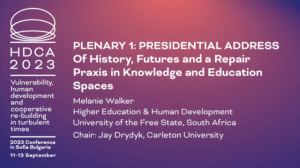September 24-26, 2024
Hosted by Pratichi (India Trust), Institute for Development Studies Kolkata, and Health Information Systems Program (HISP)
“Crises, Capabilities and Commitment”
The 2024 HDCA conference has special significance as 2024 marks the 20th anniversary of the founding of HDCA. The conference is being held in Kolkata, West Bengal, India – home of the first HDCA president, Professor Amartya Sen. The conference theme of Crises, Capabilities and Commitment has been chosen because the inter-linkages between these three ideas require in depth discussion.
Many multi-faceted crises assail us. Some are global in scope, linked with the assault on our environment, violent conflicts, pandemics and humanitarian challenges. Some crises emerge from episodic events. Others emerge less dramatically linked with a backlash to transformations in social relations, or technologies. Crises, both episodic and cumulative, reveal deep inequalities in capabilities. Crises may be associated with both ‘loud’ and ‘silent’ capability deprivations, in areas such as education, health, disability, political participation and wellbeing. The immediate and visible fallout from crises may precipitate further inequalities in capabilities linked to loss of income and employment, inequity, food insecurity malnutrition, and polarization between groups. The conference will be a setting to discuss the forms of commitment needed to analyze and address many interlinked crises and their stress on capabilities.


